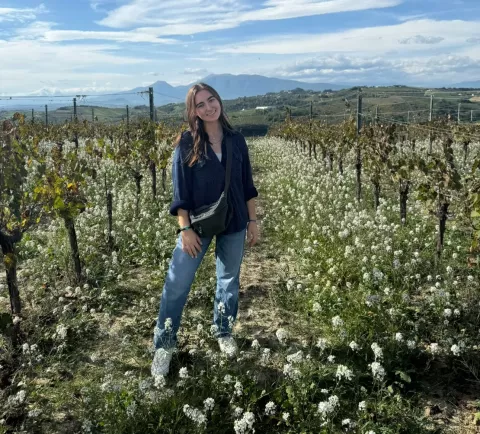
Margo Kamis is a nutrition: dietetics and ecogastronomy dual major from Glastonbury, Connecticut. She is also minoring in culinary nutrition and food studies.
COLSA: Tell us about your research in as non-technical language as possible.
Margo Kamis: At the University of New Hampshire, I am actively involved in the College Health and Nutrition Assessment Survey (CHANAS), which focuses on measuring the effects of diet, lifestyle and environment on health outcomes in young college adults between the ages of 18 and 24.
The survey collects data from students taking Nutrition in Health and Wellbeing (NUTR 400) via anthropometric, biochemical, clinical and dietary analyses. As a research assistant, I collect and input data and assist in educating the laboratory technicians on proper means of operation when it comes to how they conduct the data collection. It is through this study that I am also able to do independent research using CHANAS data, which focuses on observing if restrictive diets affect micronutrient consumption and absorption, especially in a collegiate setting.
This past year, I compared skin carotenoid measures among college students following various restrictive diets. The measurement tests the number of living cells consumed through foods rich in vitamin A, primarily various fruits and vegetables, and serves as a marker to estimate the number of cups of fruits and vegetables are consumed per week. Some of the diets I analyzed included gluten-free, plant-based, low-fat, dairy free, low-carbohydrate diets, and those who do not follow dietary restrictions, all of which were used to see if there was a difference in fruit and vegetable intakes among college students who followed said dietary practices.
Going forward, I hope to further analyze micronutrient intake by looking at bone mineral density for calcium, further expanding the information we have available about the effects of dietary restrictions on college students.
COLSA: What challenge does your research seek to address?
Margo: In healthcare research, the 18 – 24 age group often goes unexplored because they are considered to be in their prime for health compared to other age groups. It is important we explore this specific demographic to ensure the health of all and address any issues that may arise to combat the problem at the source. With the rise in dietary restrictions, whether for medical reasons or due to personal preference, there is a question whether proper nutrient intake is being met, especially for those who follow restrictions for personal preference.

Furthermore, with the rise social media’s ever-growing influence on people’s everyday dietary choices, misinformation has further complicated things. This is exacerbated for college students who must adjust to being responsible for their meals and may make poor choices, whether that be due to limited options in the dining hall, financial burdens that limit access to nutrient-dense food sources, or a lack of education regarding what they need to incorporate in their diet. It is important that research be done to explore how we can combat deficiencies, especially through education and the expansion of options to meet every student’s nutritional needs, regardless of dietary practice.
COLSA: Your work elevates research supported by the NH Agricultural Experiment Station. How will it benefit people, communities and/or the natural environment in New Hampshire?
Margo: Through my work, I aim to spread awareness about the importance of understanding meeting specific nutritional needs beyond the calories and macronutrients, regardless of what dietary restriction may be followed. This research is a steppingstone to understanding patterns that may arise among those who follow specific dietary restrictions and developing curated procedures to help combat these issues regarding these vital nutrients for our health.
I hope to take the information and use it for educating those in the state of New Hampshire on the realities of following dietary restrictions for personal preference reasons and addressing the incomplete or false diet information spread on social media. In doing so, this may help increase the likelihood that people will meet their nutritional needs regardless of the diets they choose to follow and promote overall better health and wellbeing.
COLSA: Who are you working with? (Faculty, grad students, other undergrads)
Margo: I am currently working under the advisory of Dr. Jesse Stabile Morrell, who is credited with creating CHANAS. Along with Dr. Morrell, I am joined with two other undergraduate students as research assistants, Nia Lessard ’25 and Anthony Dempsey ’27. We also work with the graduate students who TA NUTR 400 as well as the laboratory technicians who take the Introduction to Research in Nutrition class (NUTR 560).
The NH Agricultural Experiment Station helps improve New Hampshire's lives, livelihoods and landscapes through research and discoveries that sustain agricultural, food and forested ecosystems and supporting the development of future scientists. The Station research described above is based on work with joint funding from the USDA National Institute of Food and Agriculture under Hatch award number 1026518 and the state of New Hampshire.